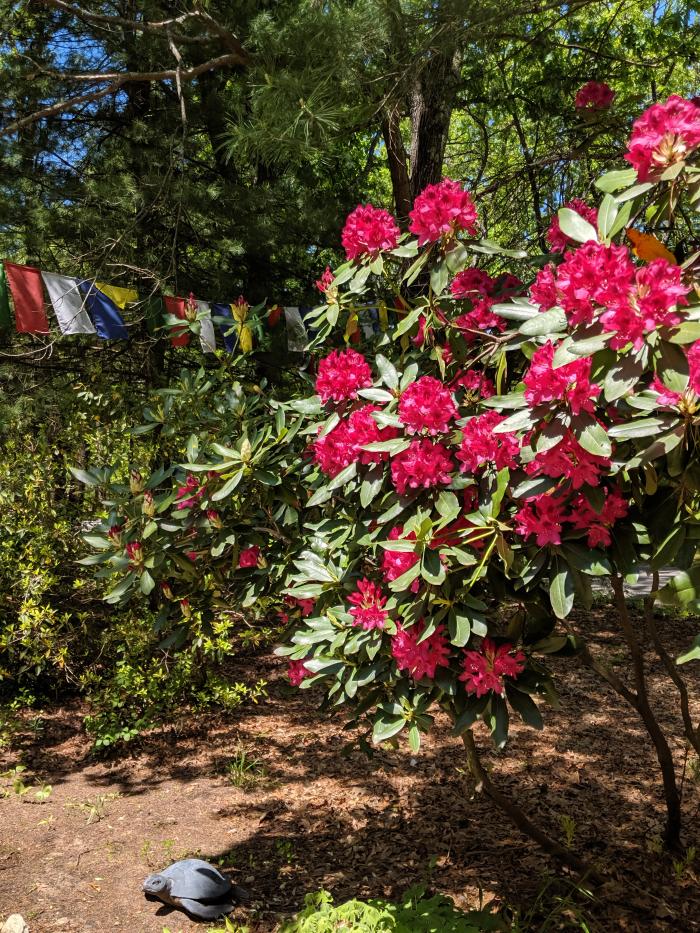Dear Friends,
Welcome to our May e-letter! Please share it far and wide.
Spring has finally arrived in Lincoln, MA! After weeks of chilly and rainy days, the hummingbirds are back and the rhododendrons are starting to bloom.
We are grateful to all of you who join us in our work together to make the teachings available to all. As a heads up, on Monday June 17th it will be Saka Dawa, the celebration of Guru Shakyamuni Buddha’s enlightenment and parinirvana. We'll send out an email to remind you of this special merit-multiplying day.
This month we're happy to share with you a new video, a new podcast, and the latest additions to our website. Read on...
From the Video Archive: Taking Refuge in the Triple Gem
Lama Zopa Rinpoche gives these preliminary teachings on refuge and bodhicitta and offers the refuge vows to the fortunate students before a Manjushri jenang at Land of Medicine Buddha on April 5, 2003.
Also, last month we shared with you our "Laughing with Lama" video, which was audio of Lama laughing with students at a teaching, and which was accompanied by a slide-show of images from that teaching. Well, we were able to locate the actual video of that teaching in our collection, so that now you can see and hear this joyful exchange! Visit our YouTube channel to check it out.
New on the LYWA Podcast: How to Purify Negative Karma
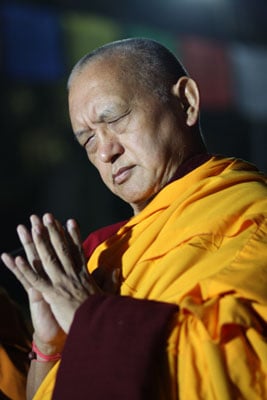 What does it mean? What does it mean? Now, it means a lot to you. Do you understand? Unbelievable. The four suffering results. You don’t experience at all. Wow! Can you imagine? So, like that we have to understand what it means.
What does it mean? What does it mean? Now, it means a lot to you. Do you understand? Unbelievable. The four suffering results. You don’t experience at all. Wow! Can you imagine? So, like that we have to understand what it means.
-Lama Zopa Rinpoche
In this month’s podcast Lama Zopa Rinpoche encourages us to understand our suffering and describes the four ripening results of our negative karma. Rinpoche then reminds us how we have the power to avoid experiencing these four ripening results by purifying our karma into emptiness. These teachings were given by Rinpoche at a Mani retreat held at the Institut Vajra Yogini, France, in May 2009. You can read along with the transcript on our website.
The LYWA podcast contains hundreds of hours of audio, each with links to the accompanying lightly edited transcripts. See the LYWA podcast page to search or browse the entire collection by topic or date, and for easy instructions on how to subscribe.
What's New On Our Website
Due to the kindness of our volunteer Vietnamese translators and editors, we have just added a new translation to the growing collection of Vietnamese translations on our website. The newest addition is titled "How to React to Harm in Accordance with the Dharma" and is based on a verse from Shantideva's Bodhicaryavatara (A Guide to the Bodhisattva’s Way of Life).
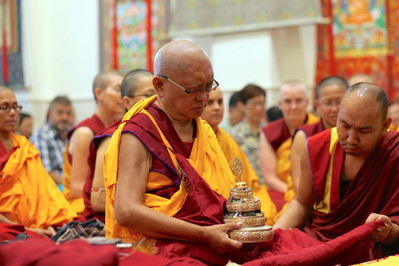 This month's additions to Lama Zopa Rinpoche's Online Advice Book include:
This month's additions to Lama Zopa Rinpoche's Online Advice Book include:
• Tso Pema, the Holy Lake of Padmasambhava: In this letter sent to his dentist, Rinpoche wrote about a sacred lake in northern India where he went on pilgrimage in February 2016, and also gave an outline of the Buddhist path.
• How Fortunate to Get Diabetes: A student wrote that their husband had been diagnosed with diabetes. Rinpoche advised a simple tonglen practice and explained why we need to develop renunciation of samsara.
• Make Strong Prayers to Medicine Buddha: This advice was given to a student whose brother was in intensive care and close to dying. The student asked what could be done for his brother to avoid rebirth in the lower realms.
• Buddha Statue on the Ground: A new center had placed a statue of the Buddha on the ground. Rinpoche saw photos of the opening of the center and wanted to pass this message on to the center director.
We've included a recent entry below as this month's e-letter teaching, advice from Rinpoche on how to transform obstacles. As always, you can find the complete list of all new additions to the Advice Book on our website.
Big Love update
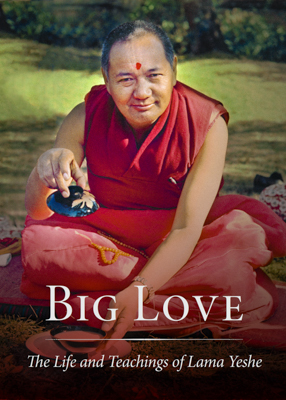 We are in the final stages of proof-reading, with our team of editors carefully reviewing the 1,500 pages of text and images to do the best we can to verify that everything is correct. It's a huge job, and we're grateful to our designer and editors for their great skill and dedication.
We are in the final stages of proof-reading, with our team of editors carefully reviewing the 1,500 pages of text and images to do the best we can to verify that everything is correct. It's a huge job, and we're grateful to our designer and editors for their great skill and dedication.
In the meantime, we've created this 5x7 postcard to get you all even more excited for the forthcoming book. Please email us if you would like some to display and give away at your Center or bookstore.
Thank you again for all your support as we do our best to spread the Lamas' message of peace and happiness to the world.
Much love,
Nick Ribush
Director
This Month's Teaching: How to Transform Obstacles
Rinpoche gave this advice on how to utilize obstacles such as illness on the path to enlightenment. In this way, we can finish the heavy negative karma collected in the past and experience great happiness.
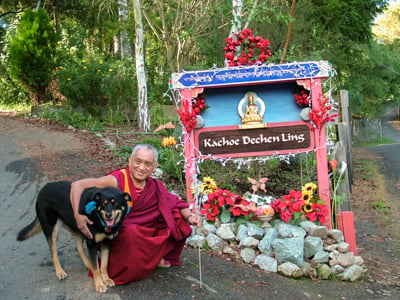 My dear one,
My dear one,
Now I hope you got better. I did some prayers. I will read the prayer for eliminating pain one time, then if your pain continues the Kopan umdze [chant master] should read the prayer a few times for you. You have to be there when he reads it.
As it is said in the teachings, first think that every happiness—day-to-day happiness, future life happiness (deva and human rebirth), nirvana, the blissful state of peace for oneself which is experienced forever, and even the total cessation of the obscurations and completion of realizations, the peerless happiness—comes from the mind.
All the happiness that we experience came from our mind, and all the suffering—hell, hungry ghost, animal, human being—came from our mind. That’s because in the past we created nonvirtue as well as harming others. All our suffering came from that and all our happiness came from virtue. So our mind is the basic creator, not God, not Buddha, Dharma, Sangha.
That’s why the Buddha said:
Do not commit any unwholesome action,
Engage in perfect wholesome action,
Subdue one’s own mind:
This is the teaching of the Buddha.
The basic thing is “Subdue one’s own mind: This is the teaching of the Buddha.” From that comes every happiness—the happiness of today and of the next life, freedom from samsara and the peerless happiness of enlightenment. Everything comes from our mind. Therefore, it’s totally up to us. We always have to use our mind in a way that is positive because it’s the cause of all our happiness. Not in a negative way, which is the cause of all our suffering. We don’t like suffering, so we have to abandon that mind. Subduing the mind, that is what is called Dharma practice. What I’ve explained is not only what the Buddha said; if we check, it is according to our own experience.
It is said in the teachings:
Even if the environment and beings are filled with the fruits of negativity,
And unwished for sufferings pour down like rain,
I seek your blessings to take these miserable conditions as a path
By seeing them as causes to exhaust the results of my negative karma.
- [Lama Chöpa, v. 96]
As mentioned in the Lama Chöpa or Guru Puja, composed by the enlightened lama Panchen Losang Chökyi Gyaltsen, we have to think like this about whatever problem we are experiencing. We have to think it’s good because we are finishing the heavy negative karma collected in the past from beginningless rebirths by experiencing it now in this life as some problem. This is instead of experiencing the result of the heavy negative karma collected in the past as suffering in the hell realms and so forth, even for eons. Experiencing the problem in this life means that due to Dharma practice we don’t have to experience all that long-term unimaginable heavy suffering of the lower realms. Just by experiencing some problem in this life, all that heavy negative karma is experienced in the form of this problem.
Not only that, in the future there will be great happiness like the sun shining. There will be greater and greater happiness, like the sun shining, then buddhahood, the total cessation of the obscurations and completion of the realizations. When the sun shines, all the people and animals in the world enjoy it. There will be incredible happiness for us up to enlightenment, like the sun shining.
Kadampa Geshe Khamlungpa said:
Even experiencing the present little suffering
Finishes our past negative karmas.
And in the future there will be happiness.
Therefore, rejoice in the suffering.
It very much depends on what we think. If we look at the quality of the situation then we rejoice. If we look at it as bad, it turns out to be a problem. So that result is not physically healthy and not healthy for the mind. It makes us sick physically and mentally.
Utilize the problem on the path to enlightenment. The best way to do this is with tonglen. Use the problem, whatever it is, to practice bodhicitta, then it gets used on the path to enlightenment, especially by doing tonglen. You should learn tonglen and do tonglen. If you don’t know how to do it, I must explain it to you.
Thank you very much. This is my advice to you, my advice for your life. This is better than going to hundreds of doctors in Singapore, including Western psychologists.
Please enjoy this.
With love and prayer ...
Sorry to add a little more. The thought transformation practice is not just to solve our problems. When we experience a problem and utilize it on the path to enlightenment, it is most beneficial to experience it, because it leads to all happiness and even enlightenment. That’s the real meaning of thought transformation.
Read more advices on this topic in Lama Zopa Rinpoche's Online Advice Book.
























